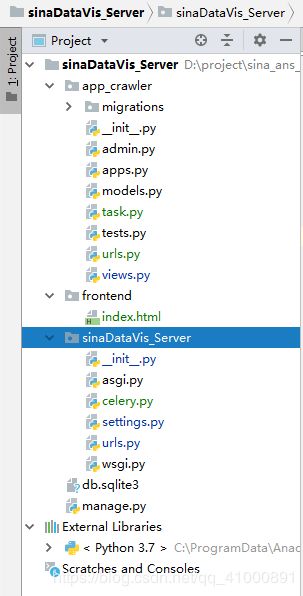celery在Django3.0中的应用——个人备忘录
写在前面:本文章非完整的技术博客,只用于记录个人开发中遇到的问题,在项目中需求通过api处理爬虫,但由于爬虫的运行时间较长,所以需要 采用异步任务的方式处理请求,因此采用了celery和Django的结合。
1.框架版本
Python 3.7
Django 3.0 +
celery 4.4.2
redis 3.2
2.基本视图结构
3.需要预先安装的组件及库
- *redis (本地开发环境为win10,redis支持最高版本为3.2;Linux稳定版本为5.0)下载链接:https://github.com/MSOpenTech/redis/releases
- *pip3 install celery (使用版本为4.4.2)
- *pip3 install redis (python应用的redis,区分redis本身)
- pip3 install django-celery (和celery不同,使用的是django自带的ORM框架,目前出现NoneType 问题,暂不使用)
- *pip3 install flower (监控celery所用,非必备)
- pip3 install eventlet (win10兼容celery所用,但会引发数据库错误,非必备)
4.重要代码备忘
①seetings.py中
# 异步任务调度设置
CELERY_TIMEZONE='Asia/Shanghai' #并没有北京时区,与下面TIME_ZONE应该一致
BROKER_URL = 'redis://127.0.0.1:6379' #最好为IP,否则容易出BUG
CELERY_RESULT_BACKEND = 'redis://127.0.0.1:6379'
CELERY_ACCEPT_CONTENT = ['application/json']
CELERY_TASK_SERIALIZER = 'json'
CELERY_RESULT_SERIALIZER = 'json'②__init__.py中
'''
celery异步任务系统配置
'''
from __future__ import absolute_import
from .celery import app as celery_app③celery.py中
from __future__ import absolute_import
import os
from celery import Celery
from django.conf import settings
# set the default Django settings module for the 'celery' program.
os.environ.setdefault('DJANGO_SETTINGS_MODULE', 'sinaDataVis_Server.settings') # 注意替换项目名
app = Celery('sinaDataVis_Server') # 注意替换项目名
# Using a string here means the worker will not have to
# pickle the object when using Windows.
app.config_from_object('django.conf:settings')
app.autodiscover_tasks(lambda: settings.INSTALLED_APPS)④app的task.py中
# from __future__ import absolute_import
# from celery import task
# from celery import shared_task
from sinaDataVis_Server.celery import app
from celery import shared_task
import logging
import time
import json
import urllib
import urllib.request
import html
import random
import datetime
from bs4 import BeautifulSoup
@app.task
def celery_test(a, b):
try:
s = a + b
time.sleep(5)
logging.info("%d + %d = %d" % (a, b, s))
return s
except:
logging.warning('has error')
return 0
@shared_task
def startcrawler_yiqing():
proxy_addr = '114.231.41.229:9999'
# ****************** 定义页面打开函数 ******************
def use_proxy(url, proxy_addr, code):
print('当前使用的IP地址:' + proxy_addr)
req = urllib.request.Request(url)
# 通用请求头
req.add_header("User-Agent", "Mozilla/5.0 (Windows NT 6.1; WOW64; rv:6.0) Gecko/20100101 Firefox/6.0")
req.add_header("Referer", "https://m.weibo.cn/")
req.add_header("Accept", "application/json, text/plain, */*")
req.add_header("MWeibo-Pwa", "1")
if code == 0: # 0 为不携带cookie
pass
elif code == 1:
# 1 为主题页面爬取的cookie
req.add_header("cookie",
"ALF=1583573469; SCF=AhF10XjHfCA9zl13WcdO_gvxRrJ3tiRNqZPZ0sOVUttaISayAZznFJz1yC6DtqqpB8HrloNszl9kbodcc2A03SQ.; SUB=_2A25zP6yNDeRhGeBM7VcQ8ifEzz6IHXVQwzTFrDV6PUNbktAKLRnzkW1NRMTg3CpunkC8xo-GxSCM9xXJfxHPBG0y; SUBP=0033WrSXqPxfM725Ws9jqgMF55529P9D9Wh7yDH2lriyw59TqUcHpGrK5JpX5KzhUgL.FoqESo-peo.RShz2dJLoI79Gqg4.qJzt; SUHB=0JvgOSxgsacUak; _T_WM=94276300838; MLOGIN=1; WEIBOCN_FROM=1110006030; M_WEIBOCN_PARAMS=luicode%3D20000174%26uicode%3D20000174; XSRF-TOKEN=69fbd3")
elif code == 2:
# 2 为博文详情页面爬取的cookie
req.add_header("cookie",
"ALF=1583573469; SCF=AhF10XjHfCA9zl13WcdO_gvxRrJ3tiRNqZPZ0sOVUttaISayAZznFJz1yC6DtqqpB8HrloNszl9kbodcc2A03SQ.; SUB=_2A25zP6yNDeRhGeBM7VcQ8ifEzz6IHXVQwzTFrDV6PUNbktAKLRnzkW1NRMTg3CpunkC8xo-GxSCM9xXJfxHPBG0y; SUBP=0033WrSXqPxfM725Ws9jqgMF55529P9D9Wh7yDH2lriyw59TqUcHpGrK5JpX5KzhUgL.FoqESo-peo.RShz2dJLoI79Gqg4.qJzt; SUHB=0JvgOSxgsacUak; _T_WM=94276300838; WEIBOCN_FROM=1110006030; MLOGIN=1; XSRF-TOKEN=63e09e; M_WEIBOCN_PARAMS=oid%3D4471167269869446%26luicode%3D20000061%26lfid%3D4471167269869446%26uicode%3D20000061%26fid%3D4471167269869446")
else:
# 其他为自行设置的cookie
req.add_header("cookie", code)
proxy = urllib.request.ProxyHandler({'http': proxy_addr})
opener = urllib.request.build_opener(proxy, urllib.request.HTTPHandler)
urllib.request.install_opener(opener)
data = urllib.request.urlopen(req, timeout=3.0).read().decode('utf-8', 'ignore')
return data
# ****************** 爬虫正体 ******************
i = 1
back_result = []
while i == 1:
weibo_url = 'https://m.weibo.cn/api/feed/trendtop?containerid=102803_ctg1_600059_-_ctg1_600059&page=' + str(i)
print('请求接口:' + weibo_url)
# weibo_url = 'https://m.weibo.cn/api/feed/trendtop?containerid=102803_ctg1_600059_-_ctg1_600059'
try:
data = use_proxy(weibo_url, proxy_addr, 1)
content = json.loads(data).get('data')
statuses = content.get('statuses')
if (len(statuses) > 0):
for j in range(len(statuses)):
print("**********正在爬取第" + str((i - 1) * 10 + j + 1) + "条主题内容**********")
if j > 5:
break
# 外层数据
# 本条ID
blog_id = statuses[j].get('id')
# 发布时间
deliver_time = statuses[j].get('created_at')
# 点赞数
attitudes_count = statuses[j].get('attitudes_count')
# 评论数
comments_count = statuses[j].get('comments_count')
# 转发数
reposts_count = statuses[j].get('reposts_count')
# 原正文内容
original_content = html.escape(statuses[j].get('text'))
# 处理后的正文内容
deal_content = BeautifulSoup(statuses[j].get('text'), 'html.parser').get_text() # bs4方式清洗
# 页面地址
page_url = 'https://m.weibo.cn/detail/' + str(blog_id)
print('博文链接:' + page_url)
# 深入获取全文内容
# 全文接口请求地址
detail_page_url = 'https://m.weibo.cn/statuses/extend?id=' + str(blog_id)
try:
data_detail = use_proxy(detail_page_url, proxy_addr, 2)
content_detail = json.loads(data_detail).get('data')
original_content = html.escape(content_detail.get('longTextContent'))
deal_content = BeautifulSoup(content_detail.get('longTextContent'),
'html.parser').get_text() # bs4方式清洗
except Exception as e:
print(e)
# proxy_addr = get_ip.get_random_ip()
continue
pass
# 作者相关数据
author_info = statuses[j].get('user')
# 头像地址
avatar_hd = author_info.get('avatar_hd')
# 个人描述
description = author_info.get('description')
# 他的关注
follow_count = author_info.get('follow_count')
# 粉丝数
followers_count = author_info.get('followers_count')
# 性别
gender = author_info.get('gender')
# 作者ID
author_id = author_info.get('id')
# 作者姓名
author_name = author_info.get('screen_name')
# 个人主页地址
author_url = author_info.get('profile_url')
print(author_name + description)
back_result.append(author_info)
# 博文详情接口有频度限制,因此基于时间缓冲
time.sleep(3 + random.random() * 3)
i += 1
# 重新循环更新最新数据
if i == 10:
i = 1
'''休眠5s以免给服务器造成严重负担'''
time.sleep(5)
else:
continue
except Exception as e:
print(e)
pass
return back_result⑤app的view.py中
from django.shortcuts import render,HttpResponse,redirect
from django.shortcuts import render
# 导入异步任务
from .task import startcrawler_yiqing,celery_test
# 加载静态界面index首页
def index(request):
return render(request,'index.html')
# 开始执行爬虫
def startcrawler(request):
celery_test.delay(int(5), int(11))
startcrawler_yiqing.delay()
# return HttpResponse('{"status":"0","message":"爬虫开启成功","result": '+ str(back_result) +'}')
return HttpResponse('{"status":"0","message":"爬虫开启成功","result": "null"}')5.启动命令
# 启动redis (cmd1)
redis-server
# 如果遇到错误无法启动,分别运行如下
reids-cli
shutdown
exit
redis-server
# 先到项目文件主目录 (cmd2)
# 启动Django
python manage.py runserver
# 启动celery (cmd3) 报错解决的方法是启动celery的时候添加参数 --pool=solo 这种启动方式会使得进程阻塞
celery -A sinaDataVis_Server worker --pool=solo -l info
# 安装gevent
celery -A sinaDataVis_Server worker -l info -P gevent
# 定时任务
celery -A sinaDataVis_Server beat -l info
# 启动Flower监控 (cmd4)
celery -A sinaDataVis_Server flower6.使用django-celery-result获取运行结果
①安装
pip3 install django-celery-results ②settings.py 配置
CELERY_RESULT_BACKEND = 'django-db'
INSTALLED_APPS = [
'django.contrib.admin',
'django.contrib.auth',
'django.contrib.contenttypes',
'django.contrib.sessions',
'django.contrib.messages',
'django.contrib.staticfiles',
'corsheaders',
'django_celery_results',
# 'djcelery',
'app_crawler',
]③基于ORM重做数据库
python manage.py makemigrations
python manage.py migrate④在admin中查看
